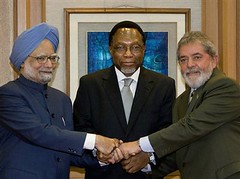
The presidents of India, South Africa and Brazil.
Originally uploaded by Pan-African News Wire File Photos
November 9, 2008
By Wiseman Khuzwayo
Johannesburg - Brace yourselves for the tough times ahead, President Kgalema Motlanthe warned in his first two major speeches this week.
Addressing the fourth national congress of the Federation of Unions of SA on Thursday, he said the financial crisis enveloping the global economy unavoidably affected all workers, including those in South Africa.
"As a trade union federation, you know that one of the most dreadful consequences on the working people emanating from this downward slide in world economic output is the gloomy prospect of layoffs and job cutbacks," he said.
On Friday he drummed home the same message when he told members of the national council of provinces that South Africa had entered a period that would test its fortitude as a nation, as well as its ability to protect the socioeconomic gains that had been made.
"We have had over four years of fairly rapid economic growth," the president said.
In this period, "we were able to add hundreds of thousands of jobs annually … the incomes of ordinary South Africans grew 4 percent a year on average, and the government was able to increase its expenditure, especially on social services, by nearly 10 percent a year on average".
Motlanthe said the country's living standards had been improving as it steadily but surely chipped away at the scourge of unemployment.
However, in the middle of this growing optimism, he said, a black cloud had suddenly descended on the world economy, posing a threat to the gains South Africa had made.
The international financial crisis was pushing many parts of the world's economy into a slowdown, especially in some highly industrialised countries, which were expecting very low growth or even the shrinking of their economies.
"In South Africa we have had to lower our expectations too, not because our own financial sector is threatened; it is not," said Motlanthe.
The country's financial institutions had been scrutinised and tested, he said. "They passed those tests with flying colours."
A financial stability assessment conducted by the International Monetary Fund and the World Bank in April and May had concluded that the nation's financial system was fundamentally sound, and had noted that the financial sector regulatory framework was sophisticated, modern and effective.
Finance minister Trevor Manuel, in his medium-term budget policy statement last month, stressed that the treasury was in daily contact with the registrar of banks, while the Financial Services Board was constantly reviewing the insurance and pension fund sectors.
These procedures were part of the responsibility for oversight of financial institutions. But Manual cautioned: "I give these assurances … not to suggest that nothing can go wrong, nor indeed pretend that our banking sector is … unconnected from international financial flows, but to indicate that your government is vigilant."
Meanwhile, in its report on the implications of the global financial crisis for developing countries, presented this week at the Group of 20 finance ministers' meeting, the World Bank said many developing countries were moving into a new danger zone, with heightened risk to exports, investment, credit, banking systems, budgets, the balance of payments, and the most vulnerable.
It said growth was slowing and was likely to weaken even more sharply. Developing country exports to developed countries were falling, capital was being withdrawn and short-term credit was drying up.
This could trigger a fall in production and cut into governments' revenues and their ability to meet health, education and gender goals, the bank said.
"Coming on the heels of the food and fuel price shock, the global financial crisis could significantly set back the fight against poverty," it said.
No comments:
Post a Comment